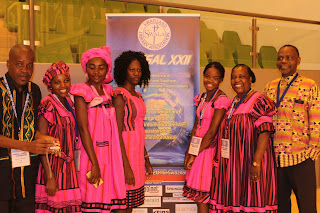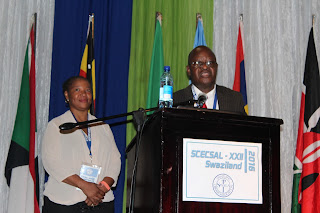 |
Ms Masechele Qoola (R) receiving the trophy from
Ms Joy Dlamini, Director, Swaziland National
Library Services |
A lone participant from Lesotho, Ms Masechele Qoola, defied all odds when she scooped the top award at the colourful SCECSAL Cultural Evening dance competition held at the University of Swaziland’s Ligcabho Lemaswati Sports Emporium on Wednesday evening.
Donned in a Sesotho traditional dress and a Sesotho blanket covering her shoulders, Ms Qoola captivated the audience with her graceful dance movements and danced her way to victory with 75 points.
The hosts, Swaziland, put up a colourful display of their traditional attire and well-choreographed moves and came in second position with 70 points.
The final standings were as follows:
1st Position – Lesotho (75pts)
2nd Position – Swaziland (70pts)
3rd Position – Botswana (68pts)
4th Position – Malawi (66pts)
5th Position – Uganda (65.5pts)
6th Position – Tanzania (65pts)
7th Position – Namibia and South Africa (64pts each))
8th Position – Zambia and Zimbabwe (62pts each)
Kenya failed to show up for the dance competition.
The two judges for the evening, Ms Sibongile Mamba and Mr. Mathokoza Sibiya, took into account the songs used, choreography, expression, and costume worn by the dancers to arrive at the rankings of the participants.
 |
| Dancers from from Malawi |
Library and information professionals from Botswana improved on their past performances, and their combination of dance, poetry and ululations received loud applause from the participants.
Malawi were original in their choice of song and dance, and the seriousness they showed in their performance earned them many supporters among the participants.
The SCECSAL Cultural Evening, a major feature of each SCECSAL conference, provides conference participants with an opportunity to showcase their traditional dancing skills in a relaxed environment.
































